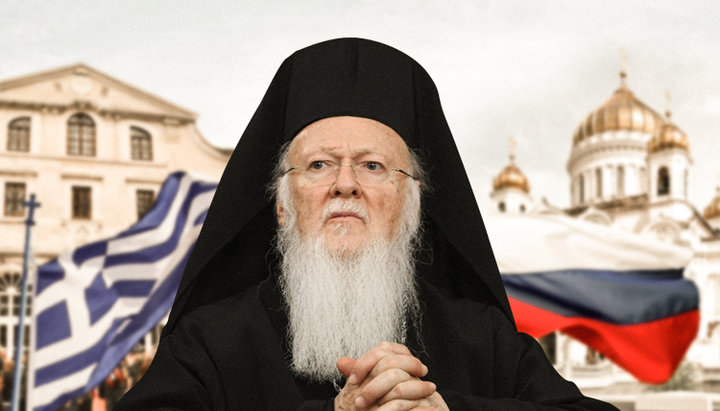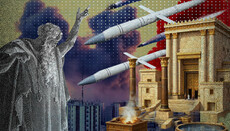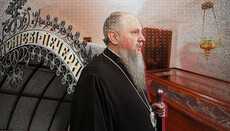Why Patriarch Bartholomew incites ethnic hatred

On how Phanariots present a schism in Orthodoxy as the struggle of the Greeks and Russians.
One of the Phanar’s leading ideological narratives is an interpretation of the schism according to which the noble Greeks in an unequal struggle oppose the attempts of Russian barbarians to seize power in the Orthodox Church. The Phanar follows the line of well-known tactics: the best defence is attack. After all, it is the Greeks who do not hesitate to advocate their superiority in Orthodoxy. Let's see how they do it and try to understand why they need it.
Even before the scandalous decisions of October 11, 2018, when the Phanar recognized Filaret Denisenko and Makariy Maletich as “reunited” with the Church, and all Orthodox faiths in Ukraine “returned” to the Phanar’s jurisdiction, Constantinople hierarchs began to actively throw in the information field ambiguous statements about the alleged desire of the Russian Orthodox Church to subjugate everything and everyone to itself. Today it is already clear that the purpose of these statements was to drill the Overton window in the history of the Ukrainian schism and present Filaret Denisenko not as the creator of the schism, but as a patriot and an innocent victim of “despotism” of the ROC leadership.
For example, on September 1, 2018, at the Synaxis of the Church of Constantinople, Patriarch Bartholomew accused Moscow of a whole series of “non-canonical interventions” in the affairs of the Kiev Metropolis since the 14th century and stated that the Kiev see was transferred to Moscow “without the canonical permission of the Mother Church”.
The statement itself is absurd. The UOJ has already cited historical documents unequivocally testifying that in 1686 the Patriarchate of Constantinople transferred the Kiev Metropolis to the jurisdiction of the Moscow Patriarchate in a completely canonical manner.
In addition, Patriarch Bartholomew accused the ROC of failing for many years to heal the schism in Ukraine: “Since Russia as responsible for the current painful situation in Ukraine is not able to solve the problem, the Ecumenical Patriarchate took the initiative to resolve the problem in accordance with the authority granted to him by the sacred canons and jurisdictional responsibility over the diocese of Kiev, having received a request for this from the honorable Ukrainian government, as well as repeated requests from "Patriarch" Filaret of Kiev to appeal his case to our consideration."
According to Patriarch Bartholomew, the responsibility for the fact that a person does not repent does not lie with him, but with the one who calls him for repentance. Let us recall the words from the Apocalypse: “Behold, I stand at the door and knock: if anyone hears My voice and opens the door, I will come in to him and sup with him, and he will with Me” (Rev. 3, 20). If the door does not open, then who is to blame in this case? The answer seems to be unambiguous, but Patriarch Bartholomew thinks differently. The head of Phanar blames the ROC for the fact that Denisenko, along with his supporters, does not repent for the schism.
According to him, Denisenko’s schism is not a schism but the desire for freedom from the “Russian yoke”: “Already from the beginning of the XIV century, when the Kiev Metropolis passed (was given) without the canonical permission of the Mother Church to Moscow, our Kiev brothers have not abandoned attempts to gain independence from church control by the Moscow center.”
According to Patriarch Bartholomew, the responsibility for the fact that a person does not repent does not lie with him but with the one who calls him for repentance.
This is also an outright lie, since there have been no such attempts. There were intrigues of the Galician princes who tried (sometimes unsuccessfully) to divide the single Kiev Metropolis into two parts in order to have their own metropolitan under their control. And in 1918 there were intrigues of individual Ukrainian politicians trying to create their own national Church, resulting in the self-consecrated Ukrainian Autocephalous Orthodox Church (UAOC). But there were no attempts by the “Kiev brothers” to obtain “independence from church control”.
Along with the accusations against the Russian Orthodox Church at the same Synaxis, Patriarch Bartholomew made a number of very frank statements about his claims to primacy throughout the Orthodox world:
- "For Orthodoxy, the Ecumenical Patriarchate serves as leaven, which ‘ferments all the dough’ (Gal. 5, 9) of the Church and history."
- “Sometimes we are faced with trials and temptations precisely because some people falsely believe that they can love the Orthodox Church and not the Ecumenical Patriarchate, forgetting that it embodies the true ethos of Orthodoxy.”
- "The Ecumenical Patriarchate is responsible for establishing the ecclesiastic and canonical order as only it has the canonical privilege."
- "The beginning of the Orthodox Church is the Ecumenical Patriarchate, ‘there is life in it, and this life is the light of the Churches’."
- "Orthodoxy cannot exist without the Ecumenical Patriarchate."
- "The Ecumenical Patriarch as the head of the Orthodox Body ..."
- "If the Ecumenical Patriarchate <...> leaves the inter-Orthodox scene, the Local Churches will become ‘like sheep without a shepherd’ (Matthew 9, 36)."
The same ideas are developed by other bishops and theologians of Constantinople:
- Metropolitan Amphilochios of Adrianople: “What would the Orthodox Church be without the Ecumenical Patriarchate? Some kind of Protestantism. <...> It is inconceivable that some Local Church <...> interrupted communion [with the Ecumenical Patriarchate] since the canonicity of its being stems from it.”
- Protopresbyter George Tsetsis: “The Patriarch of Constantinople, whether someone likes it or not, is the Primate of Orthodoxy, the visible sign of its unity and the guarantor of the normal functioning of the institution, which we call the Orthodox Church.”
At the Synaxis, Archbishop Makarios of Christoupolis read a report on the history of the Kiev Metropolis, in which, in order to justify Filaret Denisenko and thereby shift the responsibility for the schism onto the Russian Orthodox Church, he dared to make a laughing stock of himself. Exactly a laughing stock, because there is no other way to name the situation when a person dressed in the episcopal robe seriously declares that in 1990 Filaret Denisenko did not become the Moscow Patriarch because of the “Ukrainian origin”. So, the Russians are again to blame for everything.
But after all, anyone who wants to know about the election of the Moscow Patriarch in 1990 will easily find information that Denisenko was presiding with the powers of the patriarchal locum tenens at that Local Council. In the first round of elections, he had 66 votes, losing to Metropolitan Vladimir (Sabodan) of Rostov and Novocherkassk, a Ukrainian by origin who comes from Western Ukraine, who got 107 votes, and to Metropolitan Alexy (Ridiger) of Leningrad and Novgorod, a German from Estonia, who won 139 votes and was elected Patriarch in the second round of voting. So, the origin and nationality of Filaret Denisenko have absolutely nothing to do with it.
But let us return to the Russophobic statements of Patriarch Bartholomew. In the autumn of 2018, he declared before the Greek diaspora: “Our Ecumenical Patriarchate. This is where the ideals, values of our nation, the glory of our nation, the passion and martyrdom of our nation come from, their source is here. <...> At the moment, our patriarchate is trying to solve the Ukrainian ecclesiastic problem and shows its privileges and rights in accordance with the rules of the Ecumenical Councils, and these rules, especially of IV Ecumenical Council of Chalcedon, which gives specific privileges to appeal to the Ecumenical Patriarchate, these rules are mandatory for the entire Orthodoxy, whether our Russian brothers like it or not, sooner or later they will follow the decision that the Ecumenical Patriarchate will give because they have no other choice. <...> Hence, our Slav brothers do not tolerate the primacy of the Ecumenical Patriarchate and, therefore, our nation in world Orthodoxy."
The key words in this speech, repeated several times: "our nation." You might think that it is not the Orthodox patriarch who speaks but some kind of frenzied nationalist. Did the head of the Phanar forget that in the Church “there is neither Greek nor Jew, circumcision nor uncircumcision, Barbarian, Scythian, bond nor free: but Christ is all, and in all” (Col. 3, 11). And on what basis does he declare that the “Russian brothers” do not tolerate “their nation”?
There is no other way than to call the situation ridiculous when a person dressed in the episcopal robe seriously claims that in 1990 Filaret Denisenko did not become the Moscow Patriarch just because of the “Ukrainian origin”.
From the Baptism of Rus in 988 until 1917, when persecutions unprecedented in the history of Christianity began in the Russian Church, both the Russian Church and the Russian state for a millennium rendered the Patriarchate of Constantinople and other Eastern Churches large-scale financial, material, political, and sometimes military assistance.
The very liberation of the Greek state from the Ottoman yoke took place largely thanks to Russia. In 1821, the Greek uprising was led by a Russian general of Greek origin, Alexander Ipsilanti. And the Ottoman Empire recognized the autonomy of the Greek state in 1829 as part of the Adrianople Peace Treaty between Turkey and Russia after Russia won the Russian-Turkish War of 1828-1829, provoked incidentally by the Greek uprising. It can hardly be qualified as "the Russians do not tolerate our nation".
On the contrary, the Russians have always respected the Greeks and were grateful to them for Orthodoxy as an invaluable spiritual gift. Here are the words of Patriarch Alexy II of Moscow in July 1993 during the visit of Patriarch Bartholomew I to Russia: “In Tsargrad, as Russian people anciently called Constantinople with love, the holy Princess Olga received the grace of baptism; her grandson – the Holy Equal-to-the-Apostles Prince Vladimir, seeking the faith, sent his ambassadors there. There are no words that could express feelings of gratitude experienced by our believing people to the holy Church of Constantinople, which brought to Russia a saving Orthodox faith that determined all spheres of the existence of Rus.” Where is contempt for the Church of Constantinople here?
And another lie was voiced in the words of the Phanar’s head. This is a statement that the primacy of Constantinople is allegedly spelled out in the canons. The UOJ already wrote that no church canons grant the Patriarch of Constantinople exclusive rights or supremacy in the Orthodox world.
Finally, in December 2019, Patriarch Bartholomew in an interview with the online edition of Kurir.rs came to the point that he directly accused the Russians of the schism: “The Russian side has not done anything in 30 years to heal this schism in Ukraine. And where is the love for schismatics? There isn’t any. It was the Russians who made the schism, and not the Ecumenical Patriarchate or the Ukrainians, as they now say. So, the Russians made the schism and for 30 years did not take any steps to heal it."
The Patriarch should be reminded how, by his order, the Greek police special forces repeatedly stormed Esphigmenou Monastery of Athos. The monks then ceased to commemorate the Patriarch of Constantinople because of his ecumenical contacts with the Vatican; and for this, he declared them schismatics. Where is the love of Patriarch Bartholomew for schismatics?
According to the head of the Phanar, Denisenko was deposed from office because he asked for autocephaly. We recall what he was actually defrocked for: “the cruel and arrogant attitude to the clergy under his jurisdiction, diktat and blackmail (Tit. 1: 7-8; Apostolic Canon 27); bringing temptation to the community of the faithful by his behaviour and private life (Mt. 18:7; the First Ecumenical Council Canon 3, the Sixth Ecumenical Council Canon 5); perjury (Apostolic Canon 25); public slander and blasphemy against a Bishops’ Council (Second Ecumenical Council Canon 6); exercising divine offices including ordinations in the state of suspension (Apostolic Canon 28); causing a schism in the Church (Double Council Canon 15).” (from the Resolution of the Bishops' Council of the Russian Orthodox Church of June 11, 1992)
The Patriarch should be reminded how, by his order, the Greek police special forces repeatedly stormed Esphigmenou Monastery of Athos, which ceased to commemorate the Patriarch of Constantinople because of his ecumenical contacts with the Vatican. Where is the love of Patriarch Bartholomew for schismatics?
But the most incredible statement of Patriarch Bartholomew is that he essentially called the faithful children of the Ukrainian Orthodox Church Russians and accused them of schism: “It was the Russians who committed the schism, not the Ecumenical Patriarchate or the Ukrainians, as they say now. <...> As the Mother Church we had to take care of the canonical unity of millions of Ukrainians who did not want to be in the same Church with the Russians.”
Needless to say, the episcopate, clergy and millions of laymen of the UOC are citizens of Ukraine, not some hypothetical "Russians who committed the schism"? Needless to say, these millions of Ukrainians, millions of faithful children of the UOC, want to be in the same Church not only with Russians but also with Bulgarians, Serbs and the same Greeks?
Why is Patriarch Bartholomew so actively fomenting frenzied Russophobia and blaming the Russians for what he himself is guilty of, that is, the desire for domination in the Church?
The answer is as follows:
The Phanar is trying to promote its Greek (Byzantine-Constantinople) papacy. It wants to unite the conventional Greek (Greek-speaking) Churches around itself to supposedly counter these mythical claims of the Russian Church for a special role in Orthodoxy. They consciously (and completely unreasonably) mold from the ROC the image of the enemy to be opposed. And it is possible to counter it only under the leadership of the Patriarchate of Constantinople.
Our Lord Jesus Christ said: “Blessed are the peacemakers, for they will be called the sons of God” (Matthew 5, 9). But what about those who do not care about peace but incite ethnic hatred and divide Orthodoxy into Hellenic and Slavic?











